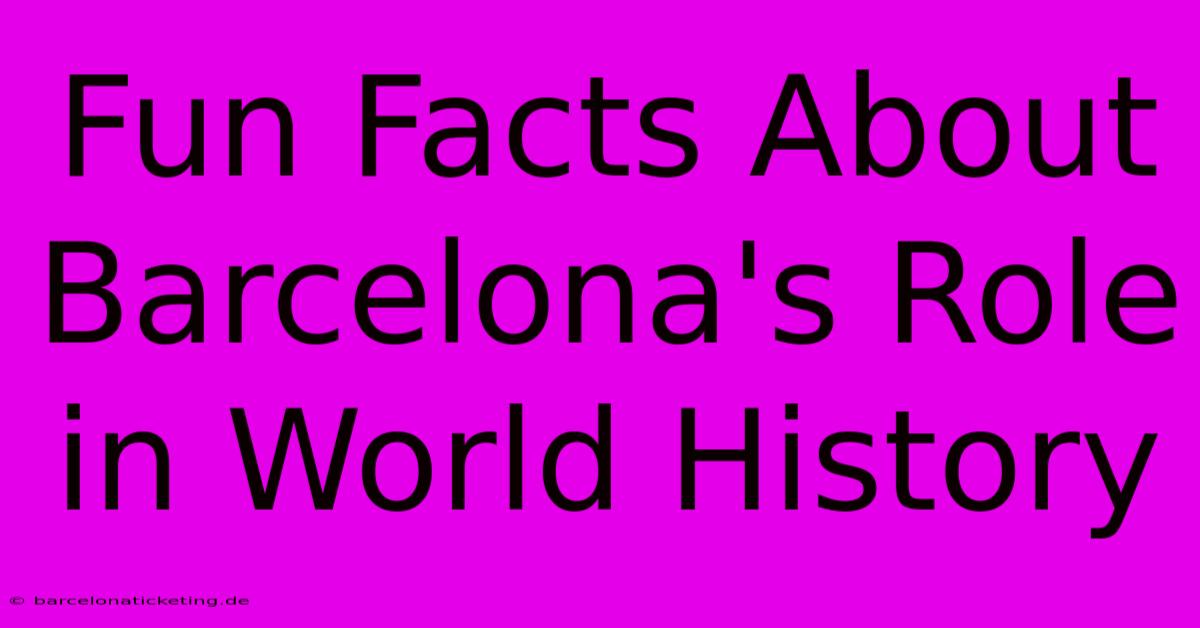Fun Facts About Barcelona's Role In World History

Table of Contents
Fun Facts About Barcelona's Role in World History
Barcelona, a vibrant city on the Mediterranean coast, boasts a rich and fascinating history that extends far beyond its current status as a tourist hotspot. From ancient Roman settlements to its pivotal role in shaping modern Catalonia, Barcelona’s past is interwoven with significant global events. Let's delve into some surprising and fun facts that highlight its unique place in world history:
A Roman Legacy: More Than Just a Pretty Face
Barcelona’s history stretches back to Roman times. Founded as Barcino in the 1st century BC, it served as a crucial military and strategic outpost for the Roman Empire. While the magnificent Roman aqueducts and remnants of city walls might be obvious, did you know that:
- Barcino was a significant trading hub: Its location on the Mediterranean facilitated trade across the empire, contributing to its growth and prosperity. This trade connected it to the vast network of Roman roads, bringing goods and ideas from across the empire.
- It played a role in the Punic Wars: While not directly the center of action, Barcino's strategic location in Hispania (modern-day Spain) meant it was indirectly affected by the conflict between Rome and Carthage. The region saw Roman military presence long before the formal establishment of the city.
- Evidence of Roman life is still found today: Excavations continue to unearth fascinating artifacts, providing glimpses into the daily lives of Roman citizens in Barcino. This constant uncovering of history keeps Barcelona's past alive and vibrant.
Beyond the Roman Empire: A Medieval Marvel
The fall of the Roman Empire didn't diminish Barcelona's importance. The city experienced periods of Visigothic rule and then became a crucial part of the burgeoning County of Barcelona, a powerful entity in medieval Catalonia. Here are some lesser-known aspects of this era:
- A center of learning: Despite its turbulent history, Barcelona thrived as a center of learning and culture during the Middle Ages. Monasteries and schools contributed to the preservation and advancement of knowledge.
- The development of Catalan identity: The County of Barcelona played a significant role in shaping Catalan culture and language, laying the foundations for the unique identity of Catalonia that persists today.
- A key player in the Reconquista: The County of Barcelona actively participated in the Reconquista, the gradual Christian recapture of the Iberian Peninsula from Muslim rule, further solidifying its power and influence.
The Rise of a Maritime Power: Sailing Towards Global Influence
Barcelona's strategic coastal location propelled it to become a major maritime power during the Middle Ages and beyond. Its influence extended far beyond the Mediterranean:
- A major player in the Mediterranean trade: Barcelona's port became a bustling hub for Mediterranean trade, connecting it to Africa, the Middle East, and the rest of Europe. This facilitated the exchange of goods, ideas, and cultures.
- Exploration and expansion: Catalan explorers and sailors, often from Barcelona, participated in major voyages of discovery, contributing to the expansion of European knowledge of the world. This maritime prowess significantly shaped the city's identity.
- Influence on global trade routes: Barcelona's role in international trade ensured it became a melting pot of cultures and ideas. This cross-cultural exchange is evident even today in the city's architecture, cuisine, and vibrant atmosphere.
Modern Barcelona: A City of Innovation and Resilience
Barcelona's history didn't end with the medieval period. The city’s modern history is equally compelling, showcasing its resilience and adaptability:
- The industrial revolution's impact: The Industrial Revolution transformed Barcelona, turning it into a major industrial center with significant implications for its social and economic landscape.
- A hotbed of Modernism: Barcelona is famous for its stunning examples of Modernist architecture, a unique architectural style flourishing during this period. Antoni Gaudí's masterpieces are a testament to this vibrant artistic era.
- A center of cultural and political movements: Throughout the 20th century, Barcelona played a crucial role in various social and political movements, shaping its modern identity and fostering a reputation for innovation and resilience.
From its Roman origins to its modern-day vibrancy, Barcelona's journey through history is one of remarkable resilience, innovation, and cultural exchange. These are just a few of the many fascinating stories embedded within the city's walls, awaiting discovery by those who take the time to explore its rich past. The next time you visit Barcelona, remember the incredible layers of history beneath your feet, shaping the city into the captivating metropolis it is today.

Thank you for visiting our website wich cover about Fun Facts About Barcelona's Role In World History. We hope the information provided has been useful to you. Feel free to contact us if you have any questions or need further assistance. See you next time and dont miss to bookmark.
Featured Posts
-
Barcelona Model Attracting Talent And Investment
Apr 08, 2025
-
The Barcelona Model A Case Study In Urban Policy
Apr 08, 2025
-
Barcelona Model A Deeper Dive
Apr 08, 2025
-
Barcelona Model Improving Air Quality
Apr 08, 2025
-
Peso Pluma A Barcelona Adventure
Apr 08, 2025
